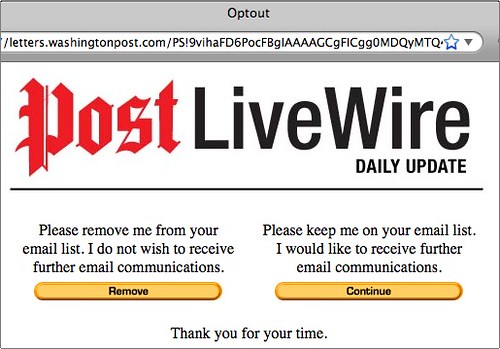Washington Post LiveWire: All the convention news you need -- whether you want it or not
As I Twittered a few hours ago, I got a "Convention Update from Post LiveWire" e-mail, and I'm pretty damn sure I didn't do anything close to subscribing to anything remotely like it.
Checking my Washington Post e-mail preferences, as well as a reply from another Twitterer, confirmed this.
Looking at the mail header, it comes from bigfootinteractive.com; Bigfoot Interactive is an e-mail marketing firm that's now part of a larger marketing company, Epsilon.
I bounced it over to my Gmail account (it went into the spam folder, shockingly), which revealed an Unsubscribe link that didn't show up in PINE (yes, I still use PINE, which is still not ELM). I clicked the link, and all was revealed:
Note the page title in the browser: "Optout."
Optout. Now, I don't care if it was a mistake, a one-time thing, or a rogue marketer -- there's nothing that will set bloggers to wiggling their tiny, Cheeto-stained typing fingers in impotent blogging rage than an e-mail marketing opt-out.
It could be an urgent evacuation notice giving the best route to high ground to avoid the oncoming asteroid-induced tidal wave -- if I didn't subscribe to it, I don't want to see it.
I find it somewhat ironic that this would happen on the very same day that the Post featured a story about companies using blogs and other social media to reach out to customers ("Marketing Moves to the Blogosphere" -- it got more than a little blog traction here because it name-checked some of the usual area and marketing bloggers.)
Especially since bloggers and blog readers -- the very users who companies try to engage using social media -- are the most enraged by things like opt-out marketing e-mails.
Anyway, as I'm in this annoyingly-vocal, self-important and overinflated minority, as I finish this little impotent screed, I can only take solace in imagining that, thanks to the voodoo that is SEO, this entry will show up somewhere in the future on the first page of results for "Washington Post LiveWire."
Checking my Washington Post e-mail preferences, as well as a reply from another Twitterer, confirmed this.
Looking at the mail header, it comes from bigfootinteractive.com; Bigfoot Interactive is an e-mail marketing firm that's now part of a larger marketing company, Epsilon.
I bounced it over to my Gmail account (it went into the spam folder, shockingly), which revealed an Unsubscribe link that didn't show up in PINE (yes, I still use PINE, which is still not ELM). I clicked the link, and all was revealed:
Note the page title in the browser: "Optout."
Optout. Now, I don't care if it was a mistake, a one-time thing, or a rogue marketer -- there's nothing that will set bloggers to wiggling their tiny, Cheeto-stained typing fingers in impotent blogging rage than an e-mail marketing opt-out.
It could be an urgent evacuation notice giving the best route to high ground to avoid the oncoming asteroid-induced tidal wave -- if I didn't subscribe to it, I don't want to see it.
I find it somewhat ironic that this would happen on the very same day that the Post featured a story about companies using blogs and other social media to reach out to customers ("Marketing Moves to the Blogosphere" -- it got more than a little blog traction here because it name-checked some of the usual area and marketing bloggers.)
Especially since bloggers and blog readers -- the very users who companies try to engage using social media -- are the most enraged by things like opt-out marketing e-mails.
Anyway, as I'm in this annoyingly-vocal, self-important and overinflated minority, as I finish this little impotent screed, I can only take solace in imagining that, thanks to the voodoo that is SEO, this entry will show up somewhere in the future on the first page of results for "Washington Post LiveWire."
Tags:
Labels: corporate blogging, marketing, messaging, rant, social media
